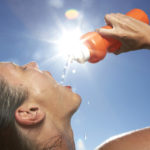Veillonella atyptica, a type of bacteria found in the guts of elite athletes, but not in sedentary people, may be transformed into a probiotic that can enhance health and physical performance in individuals that cannot exercise effectively.
Exercise is an important part of a healthy lifestyle and can even ward off disease, but not everyone is able to exercise at a level beneficial to their health, especially people with metabolic disorders and other chronic conditions. A group of researchers led by a team at the Joslin Diabetes Center and Harvard Medical School, however, have discovered that bacteria in the gut microbiomes of top athletes that can actually boost exercise capacity.
“Having increased exercise capacity is a strong predictor of overall health and protection against cardiovascular disease, diabetes, and overall longevity,” said Aleksandar D. Kostic, PhD, assistant professor and co-author of the study. Dr. Kostic studies computational and experimental approaches targeted at better understanding the relationship between the human microbiome and metabolic diseases such as diabetes. The team’s paper, entitled “Meta-omics analysis of elite athletes identifies a performance-enhancing microbe that functions via lactate metabolism”, was recently published in Nature Medicine.
Identifying Veillonella atypica
The study began by taking daily stool samples from 15 athletes who ran in the 2015 Boston Marathon. The samples were analyzed every day for one week before the marathon and for one week after. The results were compared with fecal samples taken from sedentary individuals. The post-marathon fecal samples showed a much higher presence of Veillonella atypica than the pre-race samples, and, in general, were much higher in the runners’ samples than in the non-runners’. To confirm these results, stool samples from 87 ultramarathon runners and Olympic trial rowers both before and after exercise were also taken, confirming an increased presence of bacteria in post-exercise samples.
Once the presence of Veillonella was identified, a strain was isolated directly from one of the runners and given to experimental mice, which were then made to run on a treadmill. The treated animals demonstrated much greater resistance than control mice. “Mice treated with Veillonella atypica ran, on average, 13% longer than the control group,” the authors wrote.

A performance-enhancing bacteria
The next step was to figure out just how Veillonella is able to improve exercise capacity. “As we dug into the details of Veillonella, what we found was that it is relatively unique in the human microbiome in that it uses lactate or lactic acid as its sole carbon source,” Kostic said. At first researchers thought that Veillonella acted in the removal of the lactic acid produced by muscles during strenuous exercise, yet this hypothesis was rejected. “Then the question was maybe it’s not the removal of lactic acid, but the generation of propionate,” said Kostic. Researchers then tried this new hypothesis by giving mice a propionate-containing enema and repeating the treadmill experiment. Compared with control mice, animals treated with propionate were able to run longer than control mice, similar to the results achieved with the mice given Veillonella orally. It was now determined that Veillonella metabolizes lactic acid produced by exercise and converts it into propionate, a short chain fatty acid. The human body then utilizes this propionate to enhance exercise capacity.
Veillonella and metabolic disorders
According to the project’s co-first author and molecular biologist Jonathan Scheiman, the project was initiated with the idea that the microbiomes of elite athletes shared a common type of bacteria that may help their performance and recovery. If they could identify this bacterium, it could become the basis for performance-enhancing probiotics.
People with metabolic disorders are not able to exercise at a capacity that brings about greater health benefits or prevents, for example, type 2 diabetes. The results of this study suggest Veillonella could be formulated as a probiotic supplement that could increase the exercise capacity of individuals who cannot normally achieve effective results, hence improving their overall health.
“We think that propionate could exhibit its performance benefits by counteracting inflammation, serving as an energy source for the body, and other as yet unknown effects,” says Kostic. “Of note, higher exercise capacity strongly correlates with milder progression and greater longevity in diabetes patients, which could potentially make a probiotic Veillonella approach therapeutic.”
This discovery has opened the door to a new type of performance-enhancing probiotic supplement with benefits for the entire population. One that not only can increase exercise capacity, but that can protect us from chronic disease, improve chronic conditions and ensure a healthier life.
© CrestOptics S.p.A.







